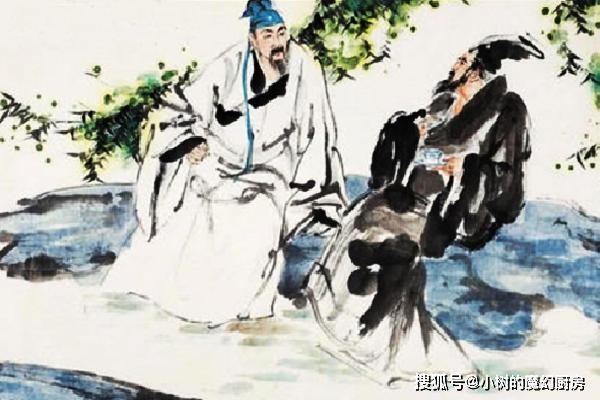Farewell, My Dear Friend Dong Chuan
- Poetry of Su Shi

A man of knowledge glows in spirit,
Though dressed in basics roughly made.
You have the golden senna pave your way
After so many years with old school mates.
You’d be so proud, and surrounded by fans,
As the Gold List shows in fresh ink 'Dong Chuan'.
Worry not if you can’t afford the horse in spring.
Wealthy ladies in carriages would be your friends.
It was during his 3-year probationary period when Su Shi first met Dong Chuan, and they had been great friends ever since. The two young talents had many enjoyable moments sharing views on life and career, especially their ambitions of great achievements for the country. They both loved poetry and often corresponded in verses echoing each other’s poems. This poem starts with a powerful line showing Su Shi’s appreciation of his friend’s graceful dispositions in contrast with his financial status. It was a common scenario that most of the applicants became short of money after years of focusing solely on their studies and also had to spend a considerable sum for months of accommodations in the capital city. Su Shi and his brother had a similar experience. Here, he seemed quite confident in Dong Chuan’s success in the Exam, encouraging him to go ahead holding his head high, even teasing him that he would get so busy with fans following him in the streets he might even find his ideal lady for marriage. Money should not be a concern by then.
The first line in Chinese ‘腹有诗书气自华’(A man of knowledge glows in spirit) has become a popular saying in praise of a well-educated man whose spiritual aura shows an impact on his surroundings.
粗缯大布裹生涯,腹有诗书气自华。
厌伴老儒烹瓠叶,强随举子踏槐花。
囊空不办寻春马,眼乱行看择婿车。
得意犹堪夸世俗,诏黄新湿字如鸦。
- Why Chinese poems is so special?
- The most distinctive features of Chinese poetry are: concision- many poems are only four lines, and few are much longer than eight; ambiguity- number, tense and parts of speech are often undetermined, creating particularly rich interpretative possibilities; and structure- most poems follow quite strict formal patterns which have beauty in themselves as well as highlighting meaningful contrasts.
- How to read a Chinese poem?
- Like an English poem, but more so. Everything is there for a reason, so try to find that reason. Think about all the possible connotations, and be aware of the different possibilities of number and tense. Look for contrasts: within lines, between the lines of each couplet and between successive couplets. Above all, don't worry about what the poet meant- find your meaning.
List of Chinese poets
Pre-Qin Poetry
Han poetry
Ban Gu Cao Cao Cao Zhi Cao Pi Cai Wenji Kong Rong Liu Bang Liu Che Qin Jia Ruan Ji Su Wu Wang Can Xiang Yu Xu Gan Zhang Heng AnonymousSix Dynasties Poetry
Tao Yuanming Zhang HuaTang poetry
Bai Juyi Bao Junhui Cen Shen Chen Zi'ang Cui Hao Chang Jian Cui Tu Chen Tao Du Fu Du Mu Du Shenyan Dai Shulun Du Xunhe Du Qiuniang Gao Shi Gu Kuang Gao Pian Han Yu He Zhizhang Han Hong Huangfu Ran Han Wo Huang Chao Jia Dao Jiaoran Jin Changzu Li Bai (Li Po) Li He Li Shangyin Liu Yuxi Liu Zongyuan Luo Binwang Li Qi Liu Changqing Lu Lun Li Shen Li Yu Li Qiao Li Yi Liu Fangping Liu Zhongyong Li Ye Meng Haoran Meng Jiao Ma Dai Pei Di Qian Qi Quan Deyu Sikong Shu Song Zhiwen Shen Quanqi Shangguan Wan'er Xuanzong of Tang Wang Bo Wang Changling Wang Wei Wang Zhihuan Wei Yingwu Wen Tingyun Wang Han Wei Zhuang Wang Wan Xue Tao Xu Hun Xu Hui Yuan Zhen Yu Xuanji Yu Shinan Yuan Jie Zhang Jiuling Zhang Ji Zhang Hu Zhang Zhihe Zu Yong Zhang Xu Zhu Qingyu Zheng Tian Zhang Bi Zhang RuoxuSong Poetry
Cai Xiang Chao Chongzhi Fan Chengda Fan Zhongyan Huang Tingjian He Zhu Kou Zhun Jiang Kui Lu You Li Qingzhao Liu Yong Mei Yaochen Ouyang Xiu Pan Lang Qin Guan Qian Weiyan Su Shi Su Zhe Song Qi Wang Anshi Wen Tianxiang Weng Juan Xin Qiji Yang Wanli Yue Fei Yan Jidao Yan Shu Ye Shaoweng Zeng Gong Zhang Xian Zhou Bangyan Zhu Shuzhen Zhu Xi Zhou DunyiYuan poetry
Bai Pu Guan Hanqing Ma Zhiyuan Xu Zaisi Yang WeizhenMing poetry
Chen Jiru Tang Yin Tang Xianzu Xu Wei Yu Qian Yang ShenQing poetry
Cao Xueqin He Shuangqing Nalan Xingde Pu Songling Tsangyang Gyatso Wang Guowei Yuan Mei Zheng Xie Zhao Yi